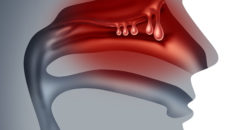
When most of us experience a runny nose, we know that it is a result of a cold or an allergy and that with some time and medicine it will go away. But what happens when days, weeks, months, or even years go by and your runny nose hasn't cleared up? As it turns out, there are several reasons why you may be experiencing a chronic or long-term runny nose (chronic rhinorrhea).
As you probably guessed, allergies are the most common cause of a runny nose. However, they aren't the only cause. Your consistent runny nose can be a result of a health condition:
1. Chronic sinusitis
Sinusitis is an infection of your sinuses, which are tunnel-like spaces in your head that connect to your nose. What causes sinusitis? This short-lived sinus infection typically occurs as a result of a viral infection or severe allergies. You may experience sinus pain and congestion, that goes away on its own.
Chronic sinusitis, however, is a long-lasting infection of your sinuses.
“Chronic sinusitis is inflammation of the nasal cavity and sinuses that lasts more than 12 weeks,” Otolaryngologist (ear, nose and throat expert, or ENT) Raj Sindwani, MD explains. “This inflammation can cause a constant runny nose that goes on for months or even years.”
RELATED: Constant Stuffy Nose? It Could Be…
2. Nonallergic rhinitis
If you notice that you are experiencing irritation or inflammation around the lining of your nose that isn't a direct result of allergies, you may have nonallergic rhinitis.
“Nonallergic rhinitis feels like allergies because you have clear fluid running out of your nose,” says Dr. Sindwani. “But your body isn’t having an allergic reaction. Instead, something is irritating your nasal passages, leading to the running and dripping.”
The good news is this condition isn’t usually serious, however, it can be quite bothersome. Hormonal changes such as pregnancy or menstrual cycles can trigger nonallergic rhinitis. Certain medications can also cause chronic runny nose.
Medications that may cause nonallergic rhinitis include:
- Antidepressants.
- Beta-blockers.
- Nonsteroidal anti-inflammatory drugs (NSAIDs).
- Oral contraceptives (birth control pills).
If you are taking any of these and experiencing chronic runny nose, you should consult with your healthcare provider to see if your medication may be the cause.
It is also a good idea to limit your use of nasal decongestant sprays.
“Don’t use nasal decongestant sprays for more than three to five days,” cautions Dr. Sindwani. “If you use them longer than that, you can become dependent on them. Then, you get rebound swelling in the nose, and your nasal congestion and rhinorrhea get worse.”
Other causes of nonallergic rhinitis include strong smells, spicy foods, stress and weather changes.
3. Nasal polyps
These non-cancerous, benign growths form in the lining of your nose or sinuses. “Nasal polyps can cause increased mucus production in the nose,” says Dr. Sindwani. “People with nasal polyps can have a constant runny nose, nasal congestion and loss of smell.”
4. Large adenoids
Adenoids are tiny pieces of tissue in the back of your throat. In most cases, young children have enlarged adenoids that shrink after age 5. A child that has large adenoids may experience:
- Chronic runny or stuffy nose.
- Feeling of ears being plugged.
- Snoring or trouble sleeping.
- Sore throat (due to mouth breathing).
5. Foreign object in the nose
Does running behind a child about to put a foreign object into their mouth or nose sound familiar? Chances are it does because like most parents you've experienced this. Children are prone to putting things in their noses, and of course, those things can get stuck.
“If there’s something stuck in your child’s nose, they could have chronic nasal drip,” says Dr. Sindwani. “But the runny nose will be on only one side, not both. See your provider anytime your child has a one-sided runny nose.”
6. Cerebrospinal fluid (CSF) leak
After a head injury or sinus surgery, the layer of tissue that holds the fluid inside your head may become damaged, causing fluid to leak out.
This leakage is known as a cerebrospinal fluid leak and can cause a unilateral (one-sided) nose drip.
If you are experiencing this, it is important that you get urgent medical attention because it can lead to an infection of your brain and spinal cord (meningitis).
“CSF has a salty or metallic taste, and it usually drips out of only one side of the nose,” explains Dr. Sindwani. “If you notice one side of your nose dripping after an injury or surgery, get medical care right away.”
7. Sinonasal tumor
Although rare, these malignant (cancerous) tumors can cause unilateral chronic runny nose.
“A possible sign of a sinonasal tumor is a long-term runny nose on only the affected side,” says Dr. Sindwani. “Usually, you would also experience other symptoms like pain, headaches or nose bleeds.”
When to see a doctor
There are a few alarming side effects that warrant a call to your doctor:
- Bloody nasal mucus or nosebleeds.
- Dripping that tastes metallic or salty.
- Facial pain.
- Fever.
- Mucus that changes from clear to yellow or green.
- One-sided running or dripping.
In most cases, chronic runny nose is the result of allergies, however, it is best to know for certain what exactly is causing your runny nose so that you can get the best treatment, especially if you haven't officially been diagnosed with allergies. Hopefully this list helps put you on the path to a healthier you!









